A Life in Focus: Celebrity Big Brother star who seared her personality onto the nation’s psyche
The Independent revisits the life of a notable figure. This week: Jade Goody, from Wednesday 23 March 2009
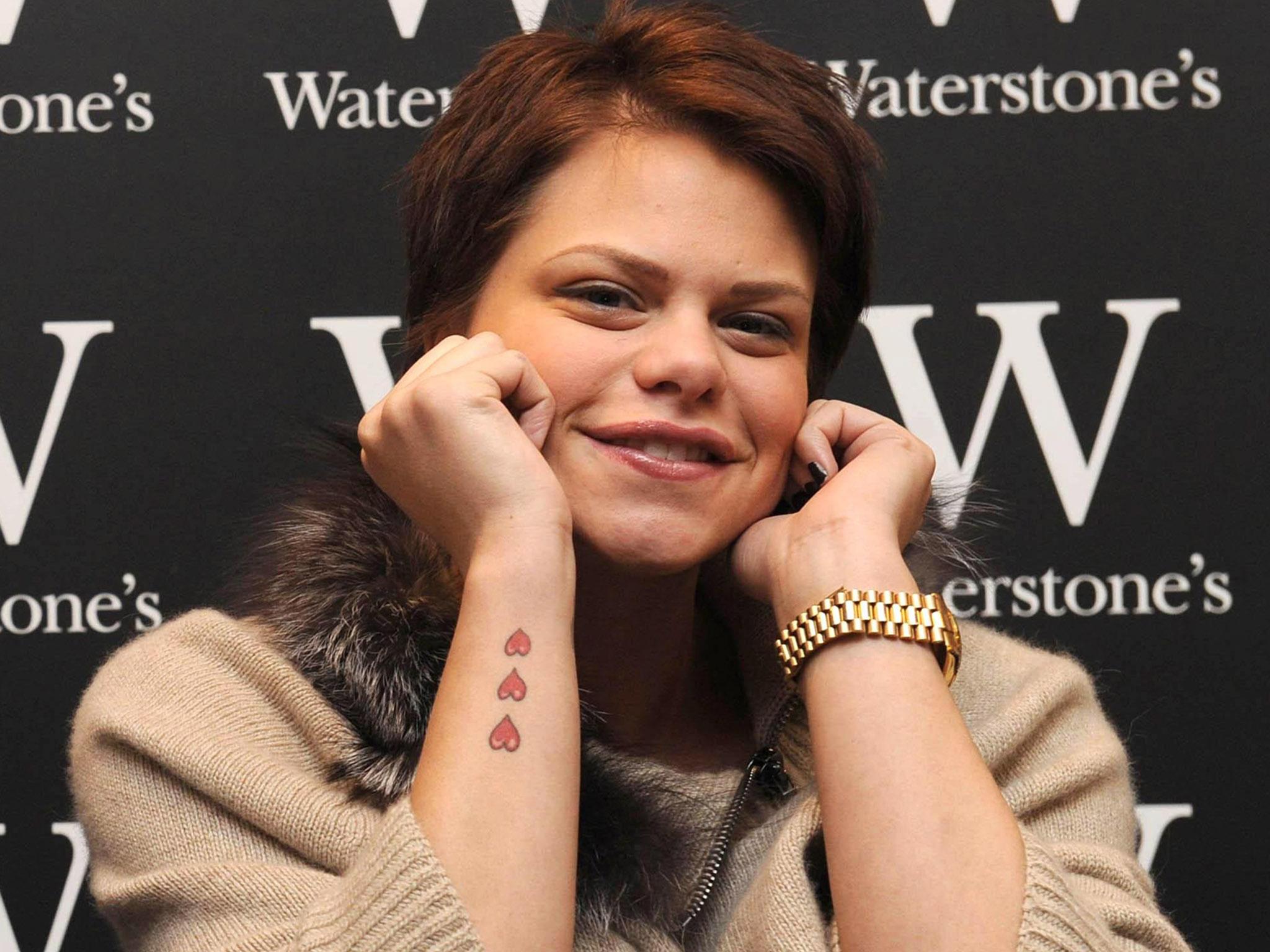
Your support helps us to tell the story
From reproductive rights to climate change to Big Tech, The Independent is on the ground when the story is developing. Whether it's investigating the financials of Elon Musk's pro-Trump PAC or producing our latest documentary, 'The A Word', which shines a light on the American women fighting for reproductive rights, we know how important it is to parse out the facts from the messaging.
At such a critical moment in US history, we need reporters on the ground. Your donation allows us to keep sending journalists to speak to both sides of the story.
The Independent is trusted by Americans across the entire political spectrum. And unlike many other quality news outlets, we choose not to lock Americans out of our reporting and analysis with paywalls. We believe quality journalism should be available to everyone, paid for by those who can afford it.
Your support makes all the difference.From the moment Jade Goody emerged from Channel 4’s Big Brother house in 2002, bursting out of an ill-fitting pink satin dress, she was a media phenomenon and an icon for the reality television-addicted, Heat magazine-loving masses. The 21-year-old dental nurse was, crucially, a product of her time, an emblem of a new era of celebrities who were famous for being famous and, through their sheer ubiquity, were known by their first names alone.
Goody's achievements were certainly remarkable. She remained in the public eye long past the perceived sell-by date of the average reality TV star. Furthermore, she turned coming fourth on a reality show into a multi-million-pound brand-name business taking in books, perfume, exercise videos and memorabilia, her much-publicised malapropisms masking a keen commercial acumen. Her treatment at the hands of the media generated a series of debates on such thorny issues as class, race and education. Some commentators went so far as to liken her to Princess Diana, citing the two women's shared hunger for attention and manipulation of the media.
Yet for many years Goody's fame appeared to be grounded in her unpopularity. Newspaper columnists and fellow Big Brother housemates ridiculed her ignorance of basic geography (prompted by her talk of “East Angular”). She was pilloried for her appearance, outspokenness, lack of education, dysfunctional relationships and thirst for the limelight. In 2007 she sparked a fierce Anglo-Indian row after making apparently racist comments about the Bollywood actress Shilpa Shetty during a stint on Celebrity Big Brother.
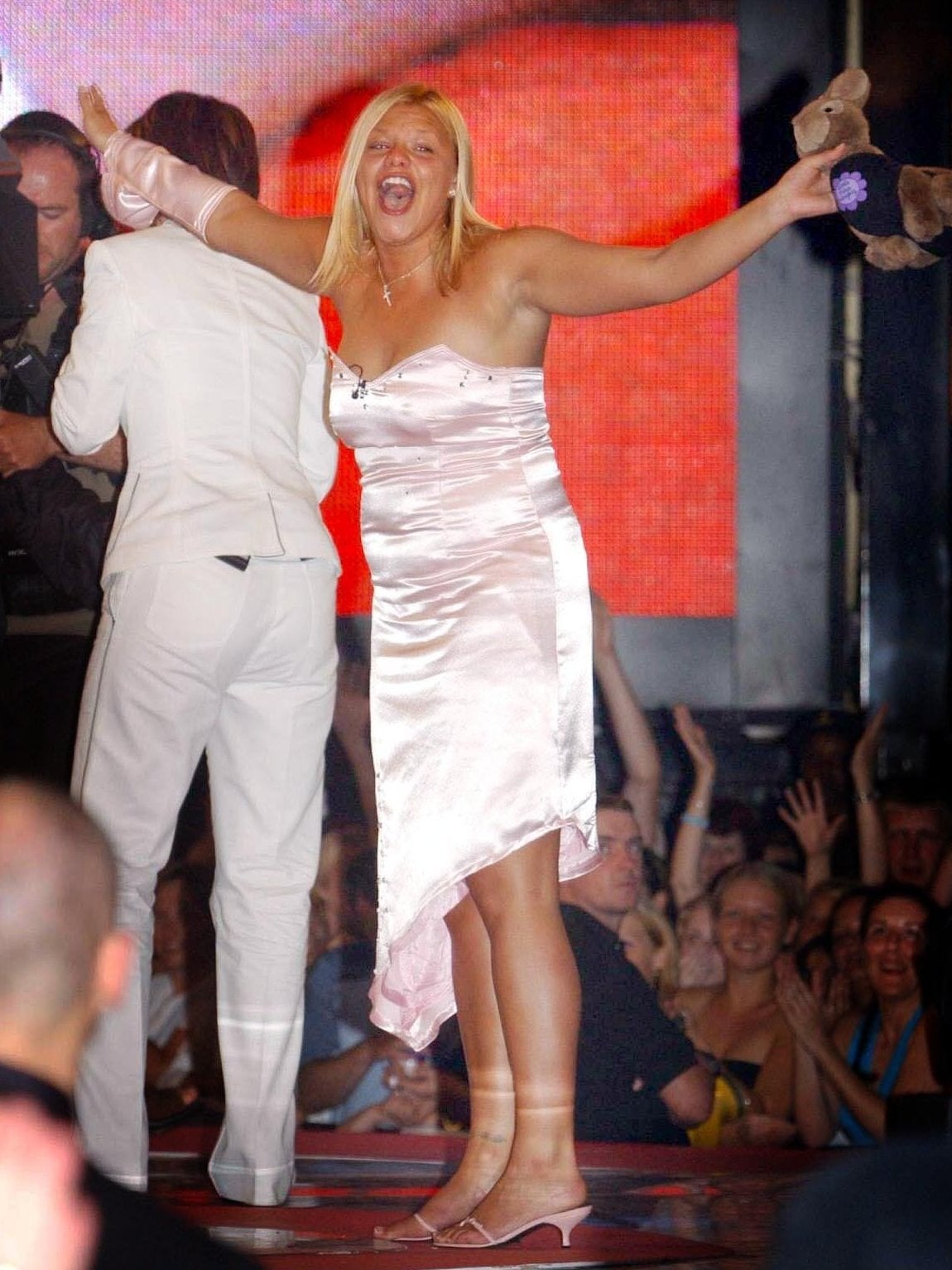
From the age of five, Bermondsey-born Goody missed out on her education in order to stay at home and care for her mother Jackiey Budden after she sustained injuries in a motorbike accident, leaving her blind in one eye and with one arm paralysed. From as early as she could remember, Goody would roll joints for her mother. When the police raided their home looking for stolen goods, she hid her mother's stolen chequebooks in the freezer. Her father Andrew was a heroin addict who was in and out of prison throughout Goody's childhood and died from an overdose in 2005. Budden had ejected him from the family home years earlier after discovering he had been hiding guns under his daughter's cot.
During Goody's teens Budden developed an addiction to crack cocaine. “The fact that she chose drugs over me was like being kicked in the teeth,” said Goody in her second autobiography Jade: Catch A Falling Star. By 2001 Goody was enduring regular domestic violence, a situation that, she said, prompted her to audition for Big Brother. She had also been evicted from a council flat in Rotherhithe for more than £3,000 of unpaid rent and was facing imprisonment over an unpaid tax bill, and hoped to win the prize-money to cover her debts.
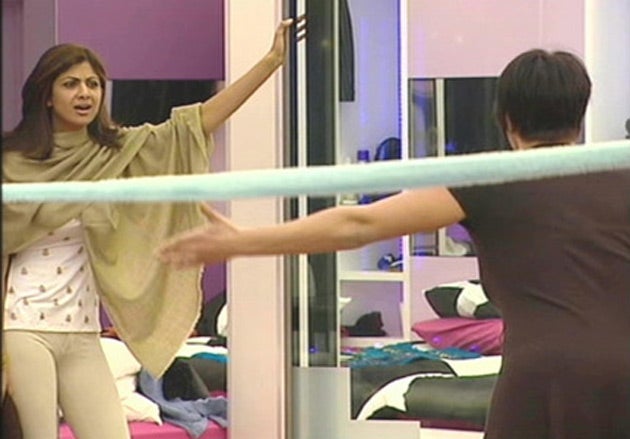
During her time on Big Brother, Jade was the target of a vicious hate-campaign by the red-top press who called her variously a “monster”, a “pig” and “the most hated woman in Britain”. Psychologists warned Big Brother producers that they feared for Goody's sanity and safety when she came out. But upon leaving the house her celebrity cachet became clear after she gave an interview to the magazine Heat. It was a breakthrough issue for the publication, selling an unprecedented 650,000 copies, and heralded the start of the magazine's obsession with reality TV stars.
Goody's post-Big Brother years were lived in the glare of publicity. She provided the media with unparalleled access to her life, with each development providing material for documentaries, autobiographies and newspaper and magazine heart-to-hearts. TV appearances included Celebrity Wife Swap, Celebrity Driving School, Celebrity Stars In Their Eyes, The Weakest Link, Jade's Salon and What Jade Goody Did Next. Meanwhile, the Jade Goody brand continued to go from strength to strength. By 2007 she had opened her own beauty salon, released three exercise DVDs, published two autobiographies and launched her own perfume called “Shh... Jade Goody”, the third most popular in the country after Kylie Minogue's and Victoria Beckham's.
Her turbulent love life was similarly catalogued throughout the pages of gossip magazines. A relationship with the television presenter and fellow reality show regular Jeff Brazier, with whom she had two sons, Bobby Jack and Freddie, collapsed after three years. Goody later castigated Brazier for his lack of financial support. She subsequently began a relationship with the model Jack Tweed, who had appeared alongside her on Celebrity Big Brother, and whose lack of job and difficult behaviour led Goody to split up with him on several occasions. In 2008 Tweed served four months of an 18-month prison sentence after he was convicted of assaulting a 16-year-old boy.
Throughout her career, Goody was clearly under no illusions about her talents and viewed the drawbacks of fame, notably the paparazzi intrusion, with equanimity. “I put myself in the limelight and I like my job,” she said. “If it wasn't for the paps outside my house, I wouldn't be in a magazine. If it wasn't for someone writing some horrible things about me one week, the next week someone wouldn't write something nice. I know it's a circle and they build you up to knock you down, and I'm happy with that.”
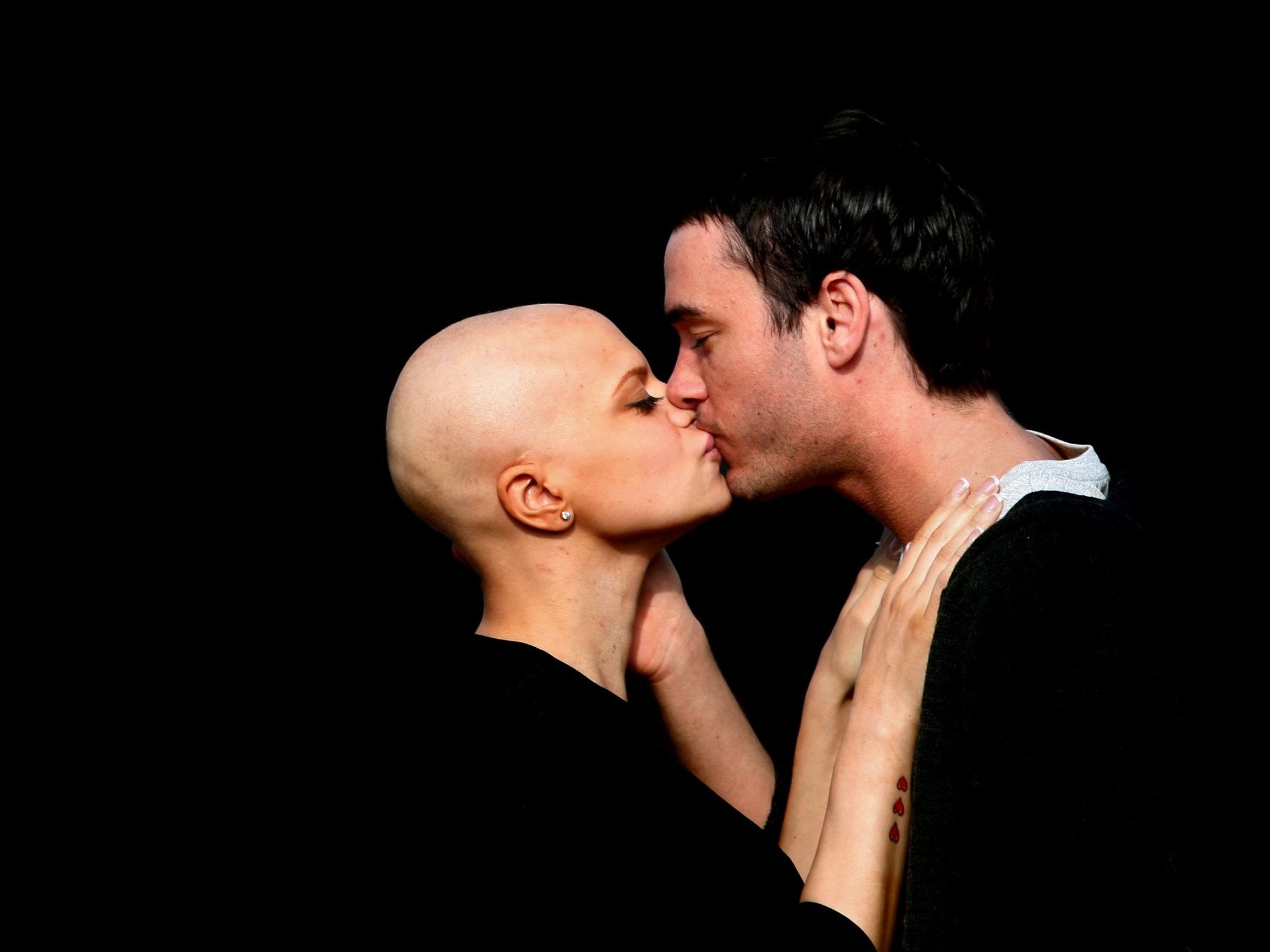
It's likely that neither Goody nor her publicity machine could have anticipated the extent of the furore that followed her appearance on 2007's Celebrity Big Brother, during which, while in conversation with the pop singer Jo O'Meara and the model Danielle Lloyd, she referred to Shilpa Shetty as “Shilpa Poppadom”. Ofcom received 40,000 complaints, Goody's perfume was taken off shelves and the paperback version of her autobiography was dropped by publishers. Even then prime minister Gordon Brown and the Indian government waded into the debate. Goody once again found herself vilified by the red-tops and held up as a terrible archetype of the white working class. Denying that she was racist, Goody retreated to the Priory to be treated for anxiety and depression and later travelled to India on a placatory mission. In the summer of 2008 she agreed to appear on the Indian version of Big Brother. It was there in the diary room that she received her original diagnosis for cervical cancer, prompting her to return to the UK for treatment.
The battle with cancer was the final chapter of Jade Goody's extraordinary life. There had been early warning signs of the disease. Pre-cancerous cells had been removed from her womb at 16, and again at 18. Before flying to India she spent a week in hospital after collapsing with abdominal pain. Her eventual diagnosis brought her back into the media spotlight, with her treatment chronicled through her Living television series Living With Jade Goody. In the programme she could be seen discussing the side effects of chemotherapy while sitting in the bath, or curled up in the back of her producer's car on the way back from treatment. The public and press largely reacted with sympathy – Gordon Brown and Piers Morgan were among those to publicly offer their support. Goody was also widely praised for helping to raise awareness of cervical cancer. Following her diagnosis, the charity Cancer Research UK reported a dramatic leap in the numbers of young women seeking information on cervical cancer. Some found her openness unpalatable, however. The ex-glamour model Jordan was among those to criticise her for exploiting her illness. Goody defended herself by pointing out that she was securing an inheritance for her sons.
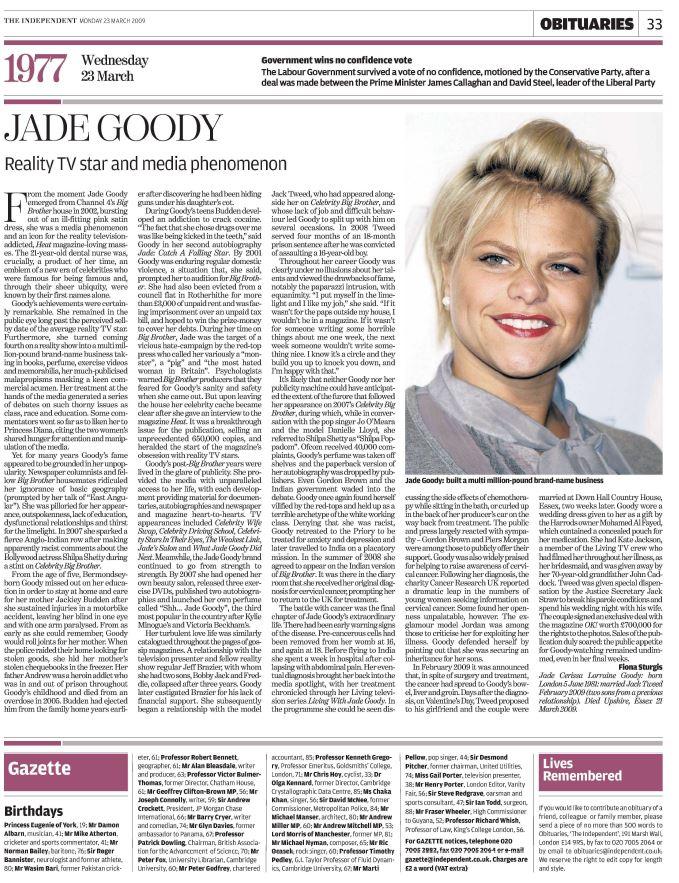
In February 2009 it was announced that, in spite of surgery and treatment, the cancer had spread to Goody's bowel, liver and groin. Days after the diagnosis, on Valentine's Day, Tweed proposed to his girlfriend and the couple were married at Down Hall Country House, Essex, two weeks later. Goody wore a wedding dress given to her as a gift by the Harrods owner Mohamed Al Fayed, which contained a concealed pouch for her medication. She had Kate Jackson, a member of the Living TV crew who had filmed her throughout her illness, as her bridesmaid, and was given away by her 70-year-old grandfather John Caddock. Tweed was given special dispensation by the Justice Secretary Jack Straw to break his parole conditions and spend his wedding night with his wife. The couple signed an exclusive deal with the magazine OK! worth £700,000 for the rights to the photos. Sales of the publication duly soared: the public appetite for Goody-watching remained undimmed, even in her final weeks.
Jade Cerissa Lorraine Goody: born London 5 June 1981: married Jack Tweed February 2009 (two sons from a previous relationship). Died Upshire, Essex 22 March 2009
Join our commenting forum
Join thought-provoking conversations, follow other Independent readers and see their replies
Comments